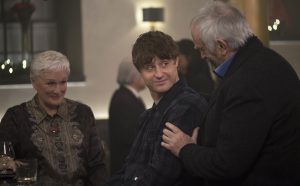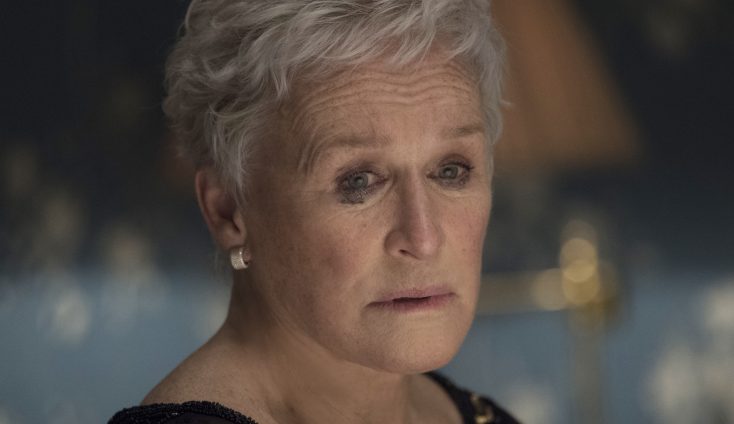
(l-r) Glenn Close as Joan, Max Irons as David and Jonathan Pryce as Joe in THE WIFE. ©Sony Pictures Classics. CR: Graeme Hunter.
By ANGELA DAWSON
Front Row Features
HOLLYWOOD—It’s serendipitous that “The Wife” starring Glenn Close about a wife and mother who has silently stood in the shadow of her famous author husband is hitting the big screen just as the #Metoo movement is hitting full stride. The drama is based on Meg Wolitzer’s bestseller which was originally published in 2003, an era when most women didn’t publicly express their disdain for being pushed into the background by their male counterparts.
“The Wife,” in the vein of 2014’s “Big Eyes,” tells the story of a couple who have endured the ups and downs of a 40-year marriage and harbor a dark secret that they’ve kept from the rest of the world, including their two (adult) children. Close plays shy and self-effacing Joan, who dutifully accompanies her brash and charismatic husband Joe (played by Jonathan Pryce) to Stockholm to accept the coveted Nobel prize for literature in 1993. Also onboard the supersonic Concorde is their son David (Max Irons), an aspiring writer who wishes only for his famous father’s acknowledgement of his talent. Their other child, a daughter, is home about to give birth to her first child.
Cracks in the longtime couple’s relationship begin to emerge from the moment they step off the plane. Joan is reluctant to attend the various receptions and events leading up the presentation of the prestigious award. A journalist (played with dogged annoyance by Christian Slater) is pressing Joe to allow him to write his biography, which for reasons the audience eventually discovers he is vehemently opposed to do.
The story flashes back to the couple’s early days together, and the audience gradually discovers more about Joe and Joan—how they met when he was a young instructor at her college, her early aspirations to become a writer and a pact made out of desperation and necessity. The past comes back to haunt them both as long-held resentment, shame and anger boil over as the awards ceremony looms. In a fun twist, the younger Joan is played by Close’s real-life daughter Annie Starke. The film is directed by Swedish filmmaker Bjorn Runge (“Daybreak”) from an adapted screenplay by Jane Anderson (“How to Make an American Quilt”). It opens Friday Aug. 17 in New York and Los Angeles and will subsequently roll out wider.
Dressed in white blouse and dark slacks for an interview, Close spoke about tackling the complex role, the unique nature of long-term relationships and working in the same film as her daughter. A six-time Academy Award nominee, the acclaimed star of stage, TV and film is getting a lot of buzz for her iconic performance in “The Wife.”
Q: How did this project come to you, and how did you get involved in it?
Close: Four years ago, I got it through my agent. I read it pretty fast and I immediately wanted to do it, even though I kind of get this instinctive thing about new territory for me. And so, I said yes and put my name on it. And then four years later, we made it.
Q: Your director Bjorn Runge said that you hesitated at first, though. Right?
Close: I wasn’t hesitant about wanting to do it but I had a lot of questions about the character. Once you put your name to something, you kind of get an instinct about a piece of writing. But yeah, one of the things that intrigued me was, for example, why she never left him and Bjorn was able to answer that question. I wanted everyone watching it to understand that. Working together around the table before we started work, we started to kind of lay the groundwork with this relationship. And then the shooting of it was very organic and fab.
Q: What was the reason that Joan didn’t leave Joe during their 40 years of marriage?
Close: I think it evolves. They actually shot (Annie Starke as young Joan) leaving and coming back, which is kind of a wonderful beginning, but then we didn’t really need it. In the beginning, they really love each other. They are just wildly in love. I really understand the scene where he says, “How can you love me if I don’t have any talent?” And then her instinct is to say, “But you’re wonderful, and I love you. And please don’t leave me because my life would be over. And I can fix it, do you want me to fix it?” We all can relate to that kind of thing. And then, little did they know… It’s wonderful that you don’t ever hear Joe actually say, “Yes, fix it.” Their life simply went in that direction and that was that.
Q: Your character is distinctive often by what she doesn’t say than what is said. How do you convey emotional silences in scenes on screen?
Close: For me, a lot of it is my imagination—imagining myself in that position, and truthfully trying to react. I’ve been in a film where the most difficult scene, which I only did once because it was so tricky. And I won’t say which film it is, but when I saw it I thought, “Oh man, I nailed it! I nailed it!” The camera was in the wrong angle. You couldn’t get my full face, and it keeps the audience from feeling that emotion. That’s one thing that I’ve learned. With a master like Bjorn (Runge, the director), he knows how to record what we do.
Q: That confrontation scene in the hotel suite between you, Jonathan and Max is chilling.
Close: Yes, and the editing that scene is perfection. Because we’re reacting to each other. And if you didn’t have that precise editing of when he says something and I react and I say something and he reacts, it may not have been as good as it is.
Q: What are your thoughts about your daughter Annie playing the younger version of your character? Do you see a lot of yourself in her performance?
Close: We have exactly the same walk. We’re both very pigeon-toed, always trying to straighten out our feet with the most unglamorous walk in the world. And I say to myself, “Turn your feet!” It’s interesting, though, because before we started doing a lot of press for this film so many people didn’t realize Annie was my daughter, and I love that. I really do.
Q: You’ve been making movies for four decades so you obviously have an affinity for the medium. Can you name your all-time favorite movie? Why is it so special for you as a moviegoer?
Close: I like “A Man for all Seasons.” It’s my favorite film. Why? Because it has brilliant writing. I love what (Sir Thomas More) says about the law. I was quoting it the other day. “If the devil turns around, and all the laws are flat, where will you be when the wind blows?” I think it’s kind of where we are in many ways in this country. So, it’s a timeless movie and it’s also one of the great film performances of all time by Paul Scofield. I love what it says and I love the ending.
Q: What film or films are you looking forward to seeing?
Close: I can’t wait to see (Jonathan Pryce in) “The Man Who Killed Don Quixote.” Seeing him in makeup is looks almost like it’s right out of the original illustration. It’s thoroughly original.





